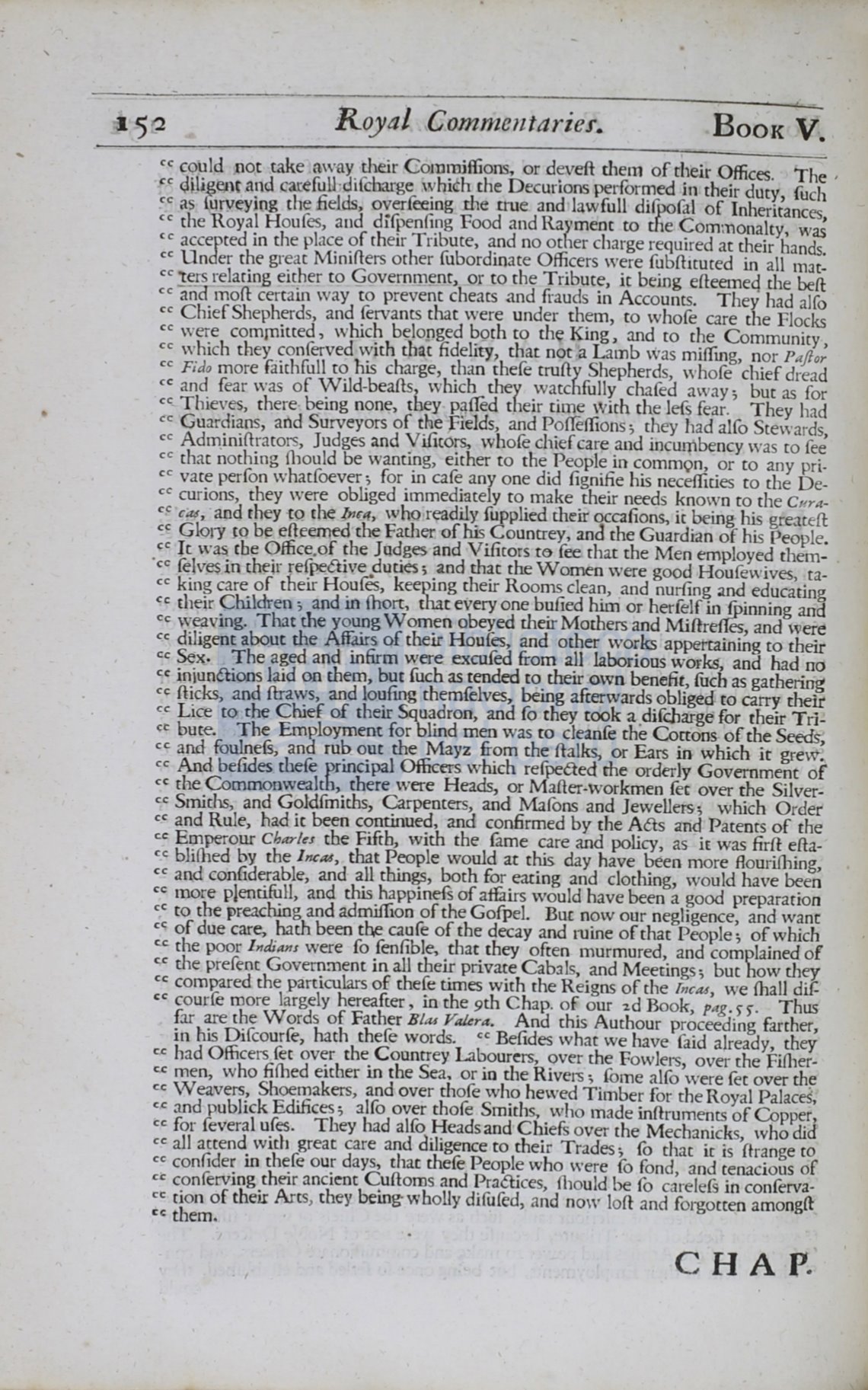

Royal
Commentaries~
BooK
~-
cc
could not take
w
y
their
Cornmiffions~
or deveft them of their Offices. The ,
cc
dUige.nta~d
efull·di harge '.hi h che De urions
perfor~ed
in
their duty, fuch
cc
a furveymg the
fields,
o erfeemg the true
and
lawfull d1ipofal of Inheritances
cc
the Royal Houfes, and d1fpenGng
ood and Raymenc
to
the Commonalty,
w~
cc
accepted in the
lace of their Tri ute, and no other charge required at their hands.
cc
Under the great Minifiers orher fubordinate
fficers
'~ere
fub(htured
in
all mat–
cc
er relating either co Government, or to the Tribute, it being efteemed the
heft
cc
and moll: certain \
ay
to
prevent cheats and fraud
in Accounts. They had alfo
cc
Chief hepherd , and fervants that
ere under them,
to
whofe care the
locks
cc
\vere committed, ' hich belonged both to the King, and to che Community,
cc
which they conferved with that fidelity, that not a Lamb ' as miffing, nor
Paftor
cc
Fido
more faithfull
to
his
charge, than thefe
rrufiy
hepherd , whofe chief dread
cc
and fear wa of Wild-beafis
\:
hich
they
atchfully chafed away; but as for
cc
Thiev s, there being none, they pa!fed their rime \ ith the le
fear. They had
cc
Guardians, and Surveyors of the Fields, and Poffeffion ; they had alfo
tei ards,
cc
AdrniniO:rators, Judges and
ificors,
whofe chi
f
are
and
incumbency "'·a co fee
cc
that nothin
0
fhould be
anting, either to the People in common, or
to
any pri–
ce
vace perfon \\·hatfoever; for
in
cafe
any
one did fignifie his neceffities to the
e–
cc
curions, they were obliged immediately to make their needs known to the
Cna–
cc
ctU,
and th
y
to che
ln~t1,
\
ho
readily
fupplied their
occafioo~
ic
ing
·
gre~
eft
cc
Glory
co be efieemed the ather of · Countrey,
and
the Guardian o h·
eople.
cc
It
w
cbe Office of the Judges and
'ificors t6 fee
that
the Men employed thern–
cc
felves in their refi Ctive duties; and that the Women
re good Houfewives, ra–
ce
king care of their Houle;, keeping their Rooms clean, and outfing
wd
educating
cc
their Children ; and
in
fhort,
that
every one bufied
him
or herfelf
in
~fi>inning
and
cc ,
·ea ing. That the youngWomen obeyed their Mothers and Milhefies, and " ere
cc
diligent
about the Affairs of their Houfes, and other works appertaining to
their
cc
Sex. The aged and infirm were excufed from all laborious
works~
and had no
cc
iniunltions laid on them, but fuch
as
tended to their own benefit, fuch
as gathering
cc
flicks, and frraws, and loufin
themfelves, being afterwards obliged to
carry
their
cc
Lice to the Chief of their quadron, and
fo
diey
took a difcharge for their
Tri–
ce
bute. The Employment for blind men was
to
cleanfe the Cottons ofthe Seeds,
cc
and foulnefS, and rub out the Mayz from the
fi
lks, or
Ears
in
which it grew.
cc
And befides thefe principal Officers which refpelted the orderly Government of
cc
the Commonwealth, there
ere Heads, or Mailer-
orkmen
fit
over the
ilver–
cc
Smiths, and Goldfmiths, Carpenter, and Mafons and
Jewellers~
which
rder
cc
and Rule, had it been continued, and confirmed by the Alts and Patents of the
c.c
Emperour
Charl~.r
the Fifth,
with
the fame care and policy, as
it
was firfi efta–
cc
blifhed by the
lnc1U,
that People
ould at this
day
have been more flourilhing,
cc
and confiderable, and all
things,
both for earing and clothing, ' ould have been
cc
more pJentifull, and this happinefs of affiiirs would have been a good preparation
cc
to the reaching and admillion of the Gofpel. But now our negligence, and want
cc
of due care, hath been the caufe of the decay
and
mine of that Pe ple; of which
c.c
the poor
Indians
were fo fenfi.ble, that they often murmured, and complained of
cc
the prefent Govem.TUent in
all
their private Caba , and Meetings; but how they
cc
compared the particulars of the(e times with the Reigns of the
lncM,
we !hall di.f–
ee
courfe more largely hereafter m the
9th
hap. of our 2d Book,
pag.
5"
>.
Thus
far are the Words of Father
BIM
Viu~ra.
And this Authour proceeding farther,
in
his
Difcourfe, hath thefe words.
cc
Befides what we have aid already,
they
cc
had Officers fet over the Counrrey Labourers, over the Fowlers, over the Fifher–
c.c
men, who fifhed either in the Sea., or in the Rivers; forne
alfo
were fet over the
cc
Vv
eaivers, Shoemakers, and over thofe who hev ed Timber for the Royal Palaces,
cc
and publick Edifices; alfo over chofe Smith wh made infirumems of Copper,
cc
for feveral ufes. They had alfo Heads and ChiefS over the Mechanick , who
did'
cc
all attend with great care and diligence to their Trades;
fo
chat
it
is firange co
cc
confider
in
thefe our days,
that
thefe People who were
fo
fond, and tenacious of
cc
conferving their ancient Cufioms and Praetices,
1
uld be
fo
carelefi
in
conferva–
cc
tion of their Arts,
they
being·
wholly difufed} and now loft and
fc
rgotten amonglt
cc
them ..
CHAP.
.
I














